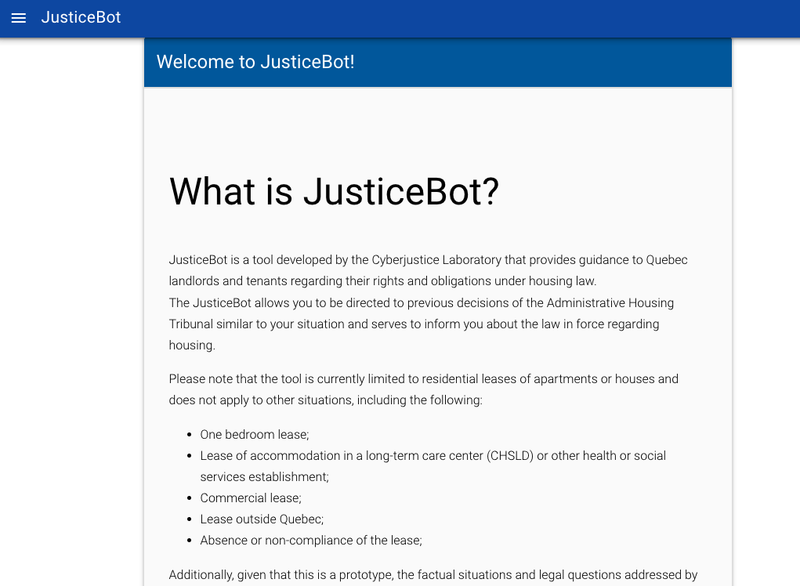JusticeBot

An AI-powered chatbot from the University of Montreal that helps the public in Quebec understand landlord-tenant rights and responsibilities, using trusted legal information.
Project Description
JusticeBot is an open-source, AI-powered legal tool developed by the Cyberjustice Laboratory at the Université de Montréal. It empowers users—especially those without legal training—to understand their legal rights and options by walking them through their problem and guiding them to legal information, past court decisions, and next steps. Initially focused on residential landlord-tenant disputes in Quebec, the JusticeBot methodology is designed to be adapted to other legal domains and jurisdictions.
JusticeBot is a web-based legal assistant that guides Quebec landlords and tenants about their rights and obligations under provincial housing law. The tool is built around a structured decision tree of legal criteria, encoded from legislation and case law. As users answer a series of questions about their situation, JusticeBot guides them through relevant legal issues and shows how similar cases have been resolved by the Administrative Housing Tribunal (TAL).
Please note: JusticeBot currently covers only residential leases of apartments or houses in Quebec. It does not apply to the following:
- Room rentals (one-bedroom leases)
- Housing in long-term care centers (CHSLD) or other social/health institutions
- Commercial leases
- Leases outside Quebec
- Cases involving missing or non-compliant leases
JusticeBot is a prototype, so its coverage of legal issues is still limited. Users who do not find answers to their specific questions are encouraged to consult a legal professional.
How does it work?
Using JusticeBot is simple. You begin by selecting a situation or goal (e.g., "My tenant is frequently late on rent"). The tool then walks you through factual questions about your case. At each step, JusticeBot presents examples of how courts have applied similar legal criteria in past decisions. These summaries help users assess their case and understand relevant legal concepts.
At the end of the guided process, users receive:
- Legal information tailored to their situation
- Summaries of relevant decisions from the Administrative Housing Tribunal
- An outline of possible next steps (negotiation, contacting a lawyer, or filing a claim)
Legal Design and Methodology
JusticeBot uses a hybrid rule-based and case-based system. The tool’s legal pathways are encoded using a visual interface that legal experts can manage without programming. Each step in the tool reflects how experts in past cases reasoned through legal questions. Past decisions are summarized and matched to user inputs, enabling comparisons to real-world outcomes while making clear that every case is unique.
JusticeBot does not predict legal outcomes or offer legal advice. Instead, it augments user understanding by helping people evaluate legal concepts using concrete, contextual examples from past decisions.
About the Administrative Housing Tribunal
The Administrative Housing Tribunal (formerly the Régie du logement) is the Quebec court responsible for handling residential tenancy disputes. Its mission includes rendering decisions, educating landlords and tenants about their rights and obligations, and encouraging dispute resolution through conciliation. JusticeBot draws its case law content from this Tribunal’s publicly available rulings.
How to Interpret Prior Decisions
JusticeBot presents prior decisions from the Tribunal to help users understand how specific legal concepts (such as "frequent lateness in paying rent") are interpreted in practice. These examples offer helpful context but do not constitute precedent or guarantees of legal outcomes. Users should understand that even seemingly similar cases can result in different outcomes due to differences in facts, evidence, or how a judge interprets the situation.
Limits & Disclaimers
JusticeBot is a legal information tool—not a substitute for legal advice. It does not provide legal opinions, recommendations, or guidance specific to individual cases. Before making legal decisions or taking action, users should consult a qualified legal professional.
The Cyberjustice Laboratory, its staff, and partners assume no liability for actions taken based on use of JusticeBot. It is provided for educational and informational purposes only.
Expanding JusticeBot
The JusticeBot methodology is being expanded to additional legal areas, such as consumer, employment, and debt law. Tools like JusticeBot TAL (Tribunal Administratif du Logement) have shown early success: since launch, they’ve served over 20,000 users. The tools are designed to support “legal health,” providing a first step for users navigating the justice system. By combining machine-guided pathways with examples from case law, JusticeBot tools help users understand their legal situation and gain confidence in resolving it.
Explore More
Learn more or try the tool at justicebot.ca.
Read more at the university project page here.
Find academic and conference papers about the JusticeBot R&D here.